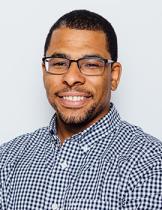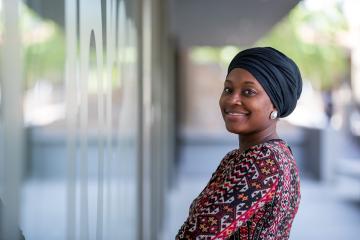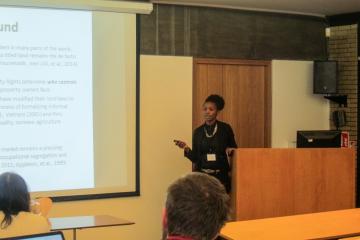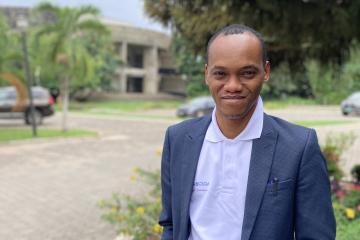
African Scholar Spotlight: Nneka Osadolor
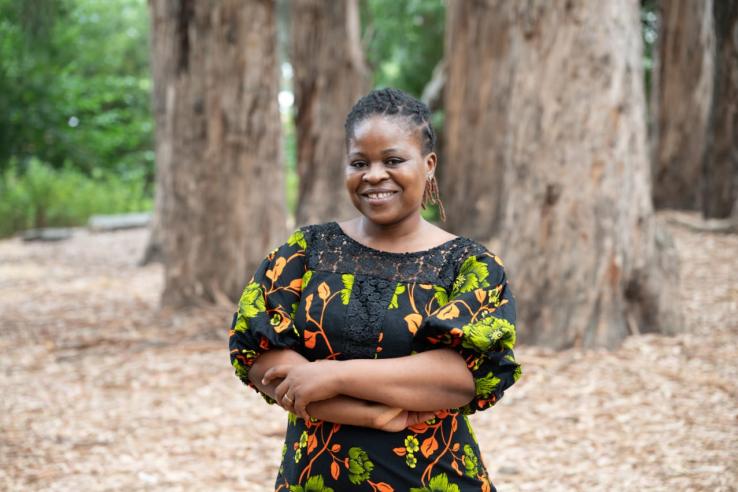
This post is part of our ongoing series showcasing the work and perspectives of economists from the African continent who are leading randomized evaluations. Through our African Scholars Program, we hope to help create more opportunities for African researchers to advance the research agenda on the continent through randomized evaluations.
In this spotlight, we speak with Nneka Esther Osadolor, a PhD candidate in economics at the University of Ibadan, Nigeria. Nneka’s primary research interests are broadly in development economics and applied microeconomics, including labor markets, financial inclusion, poverty, inequality, and gender issues.
What drew you to the field of development economics and working with impact evaluations in particular?
Growing up in a developing economy, I directly experienced the challenges of poverty and inequality and I was driven to seek solutions for these pressing social issues. As an undergraduate, I immersed myself in the study of economics and pursued a range of courses related to development and international relations. These academic pursuits motivated my keen interest in the field of development economics.
Limited access to resources was a significant hurdle, forcing me to rely on outdated textbooks in classes. To expand my knowledge, I turned to online self-study which led me to the discovery of impact evaluations—a research methodology that has gained popularity among African researchers. The appeal of impact evaluations became evident as I delved deeper into their potential as a robust research approach.
While navigating the complexities of the subject matter was not easy, I was motivated to explore other learning avenues, which led me to J-PAL’s Evaluating Social Programs and the MicroMasters programs offered through MIT.
What are you using initiative funds to do? What research question are you trying to answer and how does it relate to your context?
In a grant through the Digital Identification and Finance Initiative in Africa (DigiFI), my coauthors Evans Osabuohien (a fellow African Scholar!), Michael Mba, Owen Omorogbe, Obianuju Nnadozie, and I are assessing the potential for digital payments and flexible payment options to increase health insurance take-up amongst informal workers in Nigeria. The grant will allow us to establish relationships with implementation partners, conduct a needs assessment of the program, and meet with health insurance providers. Our hope is that this project will further our understanding of health insurance markets, the needs of informal sector workers, and the reasons behind why they are unable to access health insurance.
What are the big unanswered research questions in your context that RCTs may be able to help answer? Do you think this relates to any projects you are excited to work on in the future?
Randomized evaluations hold the potential to address numerous research questions. One such question is tackling the size and challenges of the informal work sector, which is particularly significant in Africa. Workers in this sector face suboptimal conditions. Unfortunately, only a small percentage can access the formal labor sector, leaving many struggling in the informal sector, necessitating a systemic solution.
Multiple factors drive people to choose informal work, including limited education, opportunities, or a skills gap. These reasons sparked my interest in our current proposal development grant. We have found that despite the availability of health insurance since 2006, uptake remains below 20 percent. Our goal is to increase uptake while also raising awareness about the importance of health insurance for those in the informal sector.
Randomized evaluations can also be used to answer key questions in the education space, such as improving school attendance and enhancing teaching quality. I'm particularly enthusiastic about J-PAL’s Learning for All Initiative as it will help generate the evidence that can replace intuitive decisions when it comes to education policy, leading to more efficient use of government funds. The ability to craft evidence-based policies is one of the main reasons that randomized evaluations appeal to me.
How has the support from J-PAL assisted you in your career? How can organizations like J-PAL continue to build on the support they provide to local researchers in running randomized evaluations?
Being connected to J-PAL has been transformative. Resource constraints are a significant hurdle for scholars in Africa, and J-PAL's support in providing access to resources like online courses, books, and mentorship—J-PAL connected me to Nathan Fiala for mentoring—has been crucial in shaping my career. The network of scholars within J-PAL has enabled me to seize various opportunities and progress in my research and career. Looking back, exposure to these opportunities several years ago paved the way for my current position. I strongly believe that organizations like J-PAL can continue to assist local researchers by maintaining their current efforts and incorporating feedback from scholars. By offering financial support, mentorship, and access to opportunities, organizations like J-PAL can help unlock Africa's potential. It's encouraging to note that outreach to universities across Africa can yield positive feedback from both students and faculty.
In the second half of 2023, I will be interning with IPA Nigeria through the support of J-PAL Africa. I am hoping to dive more deeply into randomized evaluations, including taking courses, learning from colleagues, and gaining hands-on experience in this field of research. Working with an organization like IPA and with local policymakers will allow me to take what I have learned and apply it practically.
Do you have advice to offer other young aspiring African scholars interested in an academic career?
My advice would be to take a leap and get involved—there are a lot of opportunities out there. I've been on a journey to find my own voice, aiming to support those who need encouragement. Perseverance is key; make the most of online resources and keep nurturing your curiosity. Being in Africa doesn't mean staying in the background; the opportunities are there, waiting to be discovered through active searching. Don't hesitate to connect with others, even if it feels daunting. As an introvert myself, I understand the feeling, but that shouldn't hinder you from seeking mentors: there are people eager to help. Remember, you won't know until you try. Starting with self-education and tapping into the internet is a solid beginning; the sky is not the limit but just the beginning.
